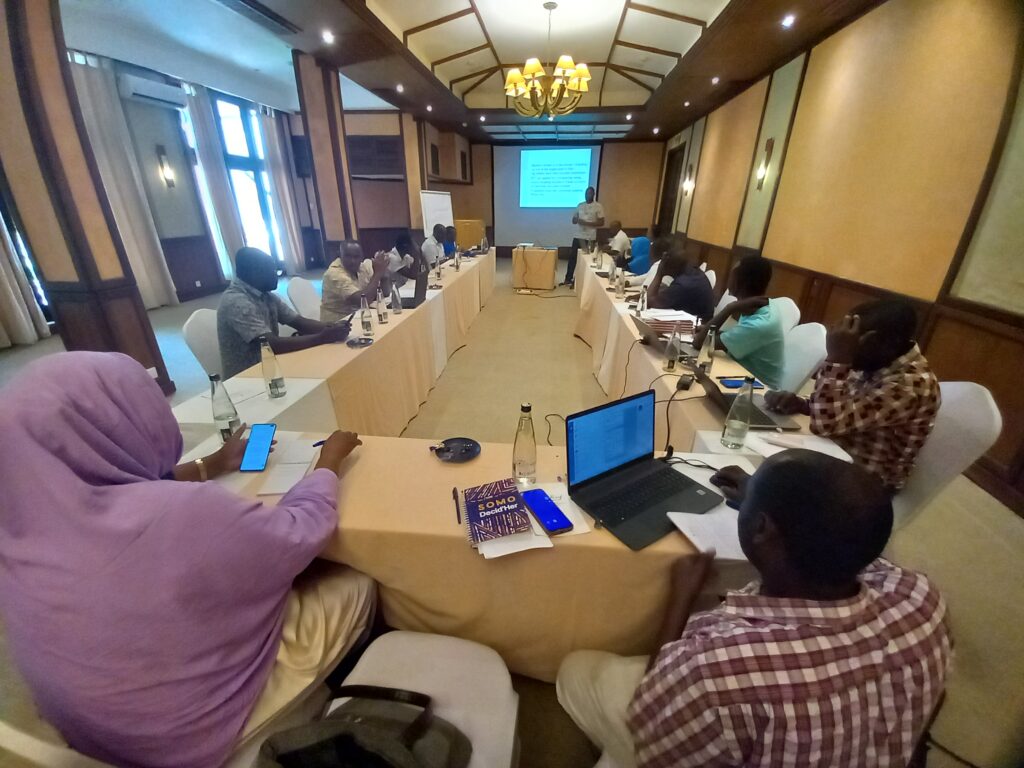BY SHABAN OMAR
The Kwale Mining Alliance, in collaboration with the Kenya Human Rights Commission, has commenced a two-day policy conversation on fiscal management and mineral royalties forum at the Diani Reef Hotel in Msambweni, Kwale County.
The forum brings together mining stakeholders, including Civil Society Organizations, local leaders, and National Government representatives, with the goal of enhancing understanding of the mining industry, its challenges, and the processes related to the disbursement of mineral royalties.
The discussions are intended to foster transparency, reflect on the impact of mining projects, examine the governing mineral laws, and advocate for the timely disbursement of mineral royalties to ensure equitable sharing of benefits from the sector.
KMA Coordinator Kashi Jarmaine, said that although the Mining Act of 2016 has been in effect for several years, the national government is yet to remit the mineral royalties to the counties.
He said despite companies like Base Titanium, the country’s largest mining firm, and many other having paid over Sh2.9 billion in royalties to the national government since 2016, counties and mining affected communities are yet to receive their shares.
Kwale County, for instance, expects to receive approximately Sh1.2 billion, Kilifi Sh350 million, and Kajiado Sh660 million.
However, these funds remain pending, raising concerns among local leaders and residents about the prolonged delay.
Jarmaine stated that the forum would help various stakeholders offer insights and solutions on how they can collectively intervene to pressure the government to release the mineral royalties
“The forum plays a significant role in calling for the government to fulfill its obligations and ensure that counties benefit from the revenues generated by local mining activities,” he said.
Jarmaine said that the mineral revenue-sharing framework—70% for the national government, 20% for counties, and 10% for local communities was established, but the implementation of the policy has faced delays.
He said the delay of the distribution of the mineral royalties has raised concerns about why the National Treasury has been reluctant to release the funds yet mining companies, such as Base Titanium and others, have consistently remitted their royalty payments to the government on time
Jarmaine emphasized that further delays in disbursing the funds constitute a violation of the Mining Act of 2016, stressing the urgency for stakeholders to unite and demand their rightful shares.
He questioned the whereabouts of the royalty funds and called for accountability, stating that the relevant authorities should be held responsible for failing to release the money on time.
Cornelious Oduor, the Executive Deputy Director of the Kenya Human Rights Commission (KHRC), expressed concern over the prolonged delay in the disbursement of mineral royalties, noting that the government’s unfulfilled promises have caused significant financial strain on local governments and communities that rely heavily on mineral revenue for development.
“The delayed payments have severely impacted the counties’ ability to implement critical development projects, especially in regions dependent on revenue from mineral extraction,” Oduor stated.
Oduor lamented that despite the Mining Act of 2016 being in effect for years, communities and counties have not received a single penny due to the absence of an effective disbursement framework.
He said that the delay has hindered essential services such as infrastructure development, education, and healthcare, depriving local residents of basic needs.
“It is heartbreaking that soem people have succumbed to poor health services, when the royalties could have played a key role in improving the lives of these communities,” said Oduor.
He further explained that the delay has disproportionately affected mining-affected residents, many of whom live in poverty, robbing them of the prosperity they were promised.
Oduor said the mining royalties were meant to uplift the communities through social and economic programs aimed at enhancing their living standards.
He also urged for greater transparency and accountability in the management of mining royalties to prevent future delays and misappropriation of the funds once released.
Oduor said stakeholders must help address legal gaps to strengthen utilization of the public resources.
He emphasized that the funds must be allocated to projects that directly benefit and uplift the local communities.
“These challenges should spark a broader conversation on the management of royalty funds,” he said.
Oduor stressed for the need for a more robust and transparent framework to safeguard mineral royalties.
“We must establish a better system to ensure that these royalties are protected and used for the benefit of the people, rather than getting lost in mismanagement and inefficiency,” he added.
Gombato-Bongwe MCA, Tumaini Mwachaunga raised concerns over the halt of numerous development projects due to delays in the disbursement of mineral royalties.
“The county had allocated these funds for vital projects, but many have been postponed as we await the release of the royalties,” said Mwachaunga.
He said that the stalled projects were crucial for improving infrastructure and meeting community needs. The extended delay, he added, has disrupted the county’s development plans, severely affecting residents’ livelihoods.


